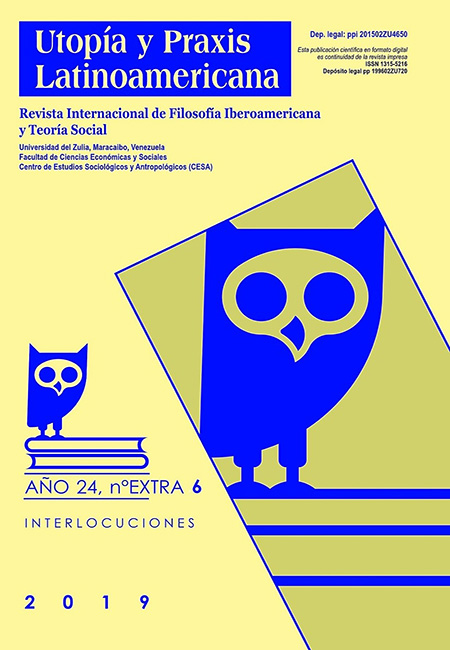Development of professionally significant qualities of future economists by means of the hidden curriculum
Resumen
ABSTRACT
The relevance of the research is determined by the necessity of the optimized training of future economists. The purpose of the research is to test experimentally a model for the formation of professionally significant qualities of future economists using the hidden curriculum technology. This article used the ascertaining experiment, formative experiment, questioning, testing, method of expert assessment, content analysis of the academic curriculum, and the mathematical statistics method. Results showed of the research identified the conditions for the development of the professionally significant qualities of future economists using the hidden curriculum technology.
RESUMEN
La relevancia de la investigación está determinada por la necesidad de la formación optimizada de los futuros economistas. El propósito de la investigación es probar experimentalmente un modelo para la formación de cualidades profesionalmente significativas de futuros economistas mediante la tecnología del currículum oculto. Este artículo utilizó el experimento de determinación, el experimento formativo, las preguntas, las pruebas, el método de evaluación experta y el método de estadística matemática. Los resultados mostrados de la investigación identificaron las condiciones para el desarrollo de las cualidades profesionalmente significativas de los futuros economistas a través de la tecnología del currículum oculto.
Citas
AHMADI, R, & MOVAHED, S (2019). “Study of Artificial Neural Networks in Information Security Risk Assessment”. UCT JOURNAL OF MANAGEMENT AND ACCOUNTING STUDIES, 7(02), pp. 1-10.
APPLE, MW (1992). "The text and cultural politics”. Educational Researcher, 21(7), pp. 4-19.
ATLAS OF NEW PROFESSIONS (2019). URL: http://atlas100.ru/index/ (Access date: 14.02.2019).
BEHADILI, SF, ABD, MS, MOHAMMED, IK, & AL-SAYYID, MM (2019). "Breast Cancer Decisive Parameters for Iraqi Women via Data Mining Techniques". Journal of Contemporary Medical Sciences, 5(2).
BERNSTEIN, B (2000). "Pedagogy, symbolic control, and identity: Theory, research, critique". Rowman & Littlefield.
BOBBITT, F (1918). The curriculum Houghton Mifflin.
BOURDIEU, P (1984). "Homo academicus (Paris, Minuit)". English end: Homo.
COX, C (2007). Cecilia Braslavsky and the curriculum: reflections on a lifelong journey in search of Quality Education for All. In-School Knowledge in Comparative and Historical Perspective (pp. 245-248). Springer, Dordrecht.
DERKACH, AA, & KUZMINA, NV (1993). Acmeology: ways to achieve professional tops.
DOUGLAS, JD, & WAKSLER, FC (1982). The sociology of deviance: An introduction. Little Brown and Company.
DUSHKOV, BA, KOROLEV, AV, & SMIRNOV, BA (2005). Encyclopedic dictionary: psychology of labor, management, engineering psychology, and ergonomics.
HERNÁNDEZ, P., VILLALOBOS, J., MORALES, M., & MORENO, J. (2016). “Racionalismo emergente en la gerencia universitaria: factor de humanización en universidades de Colombia, Venezuela y México”. In Revista Espacios. Vol. 37, No.30: 1.
KLIMOV, EA (1998). Introduction to the psychology of labor. Moscow: Kultura I Sport YUNI.
LYSYTSIA, N, MARTYNENKO, M, BIELIKOVA, N, GRON, O, & US, M (2019). "Directions of the social partnership of employers and universities in the sphere of economic education in Ukraine". Entrepreneurship and Sustainability Issues, 7(1), pp. 336-352.
MARAGHEH, SP, AZAR, ML, & MOLLABASHI, FA (2019). “Islamic Iranian Architecture in Various Zones of Iran Desert Cities from a Social Point”. UCT Journal of Social Sciences and Humanities Research, 7(01), pp. 6-12.
MARKOVA, AK (1996). Psychology of professionalism. M.: Gardarika.
MARTÍNEZ, S; RAMOS MARTÍNEZ, Y y ANNÍA, M E. (2019). El coaching en educación. Utilidad para la transformación escolar mediante sistematización de experiencias. In Opción. Revista de Ciencias Humanas y Sociales. Año 35, No. 89-2: 1388-1439. Universidad del Zulia. Maracaibo (Venezuela).
MARTINS, D, ASSIS, R, COELHO, R, & ALMEIDA, F (2019). “Decision Support System for Business Ideas Competitions”. Journal of Information Systems Engineering & Management, 4(3).
MITINA, LM (2002). Psychology of competitive personality development. M.: Moscow Psychological and Social Institute.
NALBANDI, H, & ZONOOZI, SJ (2019). “Determine the Impact of Market-orientated Skill Training on Satisfaction and Effectiveness of Trainees in Technical and Vocational Training: A Case Study in Western Azarbaijan Province, Iran”. Dutch Journal of Finance and Management, 3(1).
PASTUOVIĆ, N (1999). Educology. Zagreb: Znamen.
POLONNIKOV, AA (2017). The Modern Educational Situation: Descriptive Approaches and Discursive Responsibility. Vysshee Obrazovanie v Rossii= Higher Education in Russia, p. 209.
RAMOS MARTÍNEZ, Y. (2007). Estrategias de la gestión directiva y construcción de la grandeza docente en las escuelas bolivarianas. In Revista electrónica de humanidades, educación y comunicación social, (REDHECS). Edición 2, año 2.
REVISAN, AL, RIBEIRO, AJ, & PONTE, JPD (2020). “Professional Learning Opportunities Regarding the Concept of Function in a Practice-based Teacher Education Program”. International Electronic Journal of Mathematics Education, 15(2).
SHADRIKOV, VD (2010). Professional'nye sposobnosti. Moscow: Universitetskaja kniga, p. 320.
SMITH, MK (2000). Curriculum theory and practice. The encyclopedia of informal education.
TYLER, RW (1949). Basic principles of curriculum and instruction. (University of Chicago Press: Chicago, IL).
URDANETA, E. & VILLALOBOS, JV.. (2016). Bioética como marco de la responsabilidad social en hospitales públicos. In Opción. Revista de Ciencias Humanas y Sociales. Año 32, Especial No.12: 830-856.
VILLALLOBOS ANTÚNEZ, JV. & GANGA, F. (2016). “Derechos sociales fundamentales: Consideraciones iusfilosóficas de sus dilemas. Aproximación utópica desde la Bioética Global”. In Utopía y Praxis Latinoamericana. Año 21, N° 75: 93-111.
YOUNG, M (2017). The rise of the meritocracy. Routledge.









